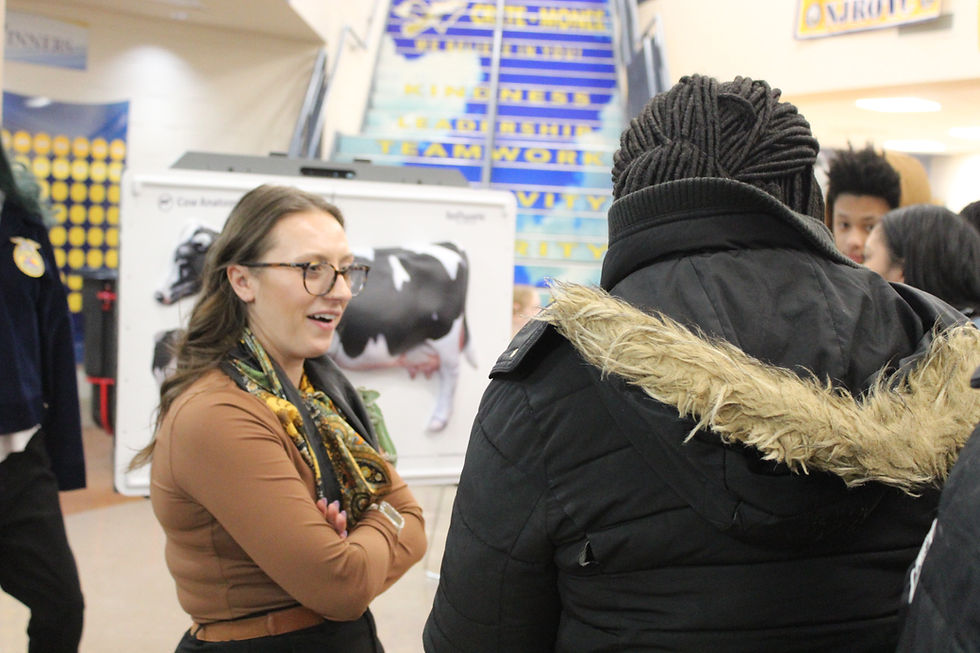Students struggle to stay awake
- Crete-Monee Blog
- Dec 15, 2024
- 3 min read
By Amiyah Rice
Editor in Chief
According to NBC News, more than 70% of high schoolers aren’t getting enough sleep. Sleep deprivation among students has been a rising problem in society. This leads students to be inconsistent and suffer many consequences that could otherwise be avoided.

A student falls asleep at his desk. Photo courtesy of https://www.simplywellblog.org/
“Warning signs of sleep deprivation in students include falling asleep in class, yawning, irritated, sugar cravings, energy drinks or caffeine cravings, and headaches/stomach aches,” physics and biology teacher Ms. Sosur said.
Ms. Sosur believes the main problem is entertainment on electronic devices. She thinks students should get eight to ten hours of sleep.
“I know no one wants to hear it, but putting tech down 30 minutes before you plan to sleep is the best way to get more sleep. Research has shown that blue light from our phones slows our brains from making melatonin, the hormone responsible for sleep,” Ms. Sosur said.
Junior Yaslin Strong said phones are the main reason students aren’t getting sleep, and when it happens, it’s hard to focus.
“Some activities take a lot of time after school, and kids are not able to take naps, or they get home late, and then they stay up late, and they don't want enough sleep,” Strong said.
Strong said she struggles with sleep deprivation because she procrastinates. When she procrastinates, she stays up late, which leads her to be tired.
Sophomore Takyla Lockridge gets only four hours of sleep because of school, extracurricular activities, and homework.
“Sometimes I see that they do go to sleep during school. That's one of the biggest signs I see and kids with baggy eyes. That's one of the first things I look at when I see somebody's face,” Lockridge said.
Lockridge went on to say that people become anxious, sad, and depressed when they don’t get enough sleep.
Junior Adebola Akande said friends, academics, and sports take up time, and it leads to students being tired.
“It's in between students being on social media and also the academic portion because if you're taking regular classes, you should have no problem getting the work done in a timely manner.But in the case of AP, maybe some honors, I would say that it could be challenging, especially if you do some sports because you're expected to do more and strive for the better,” Akande said.
Literacy coach Mrs. Godbout said things in the world are distracting, and screens/entertainment don’t help either.
“Parents can monitor screen time for their children and encourage them to unplug prior to going to sleep. As far as schools, there are lesson plans and learning materials from teen health organizations that schools can use to teach students about how to have healthy boundaries with technology, as well as the importance of sleep,” Mrs. Godbout said.
Mrs. Godbout said for students suffering from sleep deprivation, “Don't drink coffee or energy drinks after 6 p.m. and work on time management.”
Junior Carli Sawallisch said students should target eight to ten hours of sleep because high school students are busy.
“It depends on the extracurricular and what time the practices. Like, if you have a practice and it's from like six to nine, then that's to blame for the extracurricular activity, but, if not, then, no, you should be getting enough sleep,” Sawallisch said.
“When you're not sleeping, your brain isn't developing properly because, you know, if you read articles in science, you know that sleep is a huge part of your brain development,” junior Mine Ekasa said.
Ekasa does believe students should get eight to ten hours of sleep. She also blames the phone for the lack of sleep students are getting.
High school students should get eight to ten hours of sleep. Students should also take breaks from phones and social media to ensure they get enough sleep.





Comments